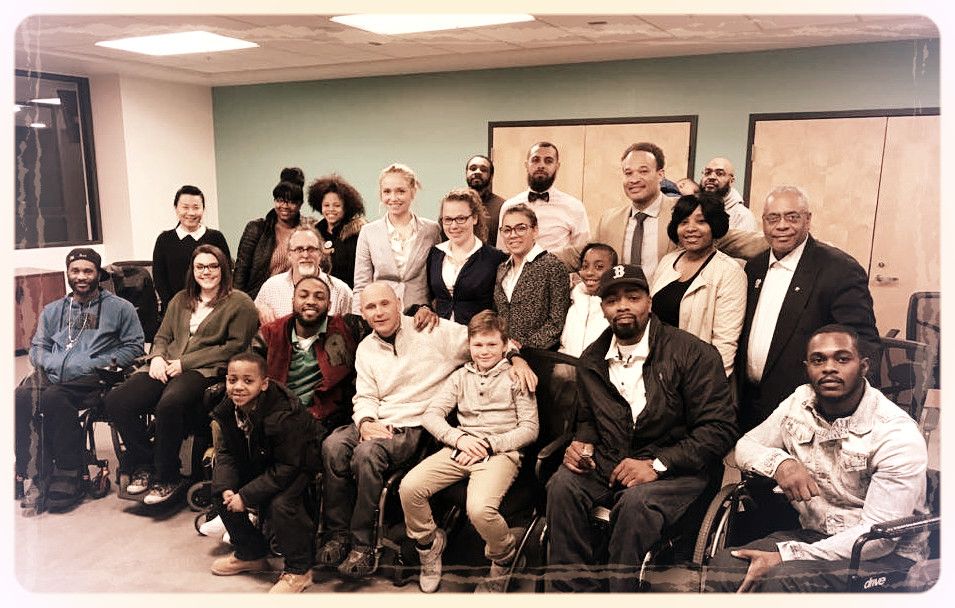Dec 28, 2023
The Stories We Tell
by Matthew Rodreick
In the wildly popular Game of Thrones TV series there is a brilliant articulation of the power of stories. Two of the central characters, Brandon Stark (who has a SCI) and Samwell Tarley have this conversation about the villain they are facing in battle:
Bran: …he wants to erase this world, and I am its memory.
Samwell: That’s what death is isn’t it? Forgetting. Being forgotten. If we forget where we’ve been or what we’ve done, we’re not men anymore…your stories aren’t just stories. If I wanted to erase this world, I’d start with you.

Bran Stark (left) played by Isaac Hempstead Wright and Samwell Tarley (right) played by John Bradley in the HBO series Game of Thrones.
I credit the writers for making one of the central heroes of the expansive story a kid with a SCI. He is the keeper of all the Game of Thrones History…its stories. Destroying him means destroying history.
When the particular stories and struggles of the SCI community aren’t heeded or centered in the research economy there is a danger of forgetting. Then everything that’s decided about us is decided without us. Bran’s statement about being erased exemplifies the weight our community carries - and any community that seeks to change the world as it is.
I was thinking about Bran as I drove to Madison a couple weeks ago for another trip to the Wisconsin Capitol with our advocates. We had booked a new round of meetings with Assembly and Senate leadership to once again tell our stories, in the hopes that it will keep our bill top of mind and provoke legislators to move on our behalf. Though I know it was strategically smart for us to do this, I must admit, I didn’t want to go.

The Christmas tree in the rotunda at the Wisconsin Capitol in Madison.
I had hoped we would be done by now, that we would have passed another SCI research grant bill this past fall, and would be working to structure a Wisconsin funding program. Instead, I was driving four hours in the cold, trying to remind myself not to let my anger at this prolonged process interfere with our meetings.
Like our advocates, I’m frustrated that we have to tell our stories over and over again in vulnerable detail; rehashing accidents, pressure sores, UTI’s, caregiver issues, financial issues and on and on. Not surprisingly, some of the advocates don’t keep coming back. Wisconsin isn’t the first time I’ve heard one of our advocates say, “I can’t do it again…I can’t spill my guts to another legislator just to have them smile and say ’Thanks for sharing your story,’ while they do nothing to support our cause.”
On the one hand, I don’t envy legislators. They listen to a lot of stories, and hear about a lot of important causes. And they are tasked with making hard decisions about the people’s money on wide ranging and complex issues.
On the other hand, some of the responses we’ve received over the years span from troubling to infuriating. I’ve heard the below replies with my own ears after one of our advocates pours their hearts out:
- “You should be happy enough that you have a power chair to get around”
- “I knew someone injured in high school that prayed/exercised/willed themselves to a miraculous recovery”
- “I understand…I broke my leg once and was in a wheelchair for weeks”
- Or the classic: “Y’all are so inspiring!”
These responses ring in my ears months and years after first hearing them. They tempt me towards becoming cynical. And it’s once again got me reflecting on the power of stories. How stories define and sometimes challenge our reality. Who tells them? Who listens to them? What stories matter to us and what stories don’t? And why?

Mike Mohr, giving testimony at a Senate hearing for our bill earlier this year. Mike has testified twice on behalf of our bill and showed up multiple times over the last several years for legislator meetings at the Capitol.
Our work at U2FP is driven by telling our stories to change our outcomes. Part of our job is to amplify the stories of people with a spinal cord injury, so that those in the research economy better understand the lived experience of this injury in order for their work to be applicable and successful. Because not unlike Bran, our stories say quite a bit about everyone.
This is why we need to tell our stories. They challenge the subtext of our culture’s current values: is Lebron James’ body more important than yours? Is our military budget in appropriate balance with our health/science budgets? Is the asset cap for people on assistance just or is it a punishment - the result of being forgotten?
On my drive back from the Wisconsin capitol, I was mulling all of this when I remembered what a lobbyist had told me years ago: the average time for state level legislation to cross the finish line (from inception to passage) is six years. Starting with Minnesota in 2015, our SCI community has passed nearly $35M in research grant legislation in four states over the past eight years…not bad.
But as always, the clock is ticking. Our community can’t wait. And I don’t want our success rate to simply revert to the average. Which is why I’m encouraging you to make a year-end gift to U2FP. Your generous donations have fueled the success we’ve had.
All that to say, keep sharing your stories and keep leaning on the community you have - both locally and here at U2FP. It’s no accident we use that word - “community” - instead of 'patient’ or ‘consumer’. Our board and staff understand that we all need to lean on each other for support, encouragement and motivation. And keep telling our stories to remake the world from what it is to what it could be.
PS - Despite the struggle, telling our stories and passing these legislative bills is worth it. We’ve now seen more than 200 people with an SCI receive meaningful interventions thanks to these bills. And I believe there is a snowball effect to this work. So please, make a year-end gift to U2FP today. Thank you.

















